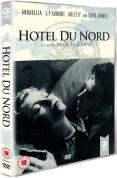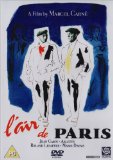![The Longest Day - Single Disc Edition [1962]](/pictures/1002160.jpg) The Longest Day - Single Disc Edition | DVD | (17/04/2019)
from £6.29
| Saving you £11.70 (186.01%)
| RRP
The Longest Day - Single Disc Edition | DVD | (17/04/2019)
from £6.29
| Saving you £11.70 (186.01%)
| RRP On June 6 1944 the Allied Invasion of France marked the beginning of the end of Nazi domination over Europe. The attack involved 3 000 000 men 11 000 planes and 4 000 ships comprising the largest armada the world has ever seen. Presented in its original black & white version 'The Longest Day' is a vivid hour-by-hour re-creation of this historic event. Featuring a stellar international cast and told from the perspectives of both sides it is a fascinating look at the massive
![Le Jour Se Leve - 75th Anniversary Edition [DVD] [1939]](/pictures/1127849.jpg) Le Jour Se Leve - 75th Anniversary Edition | DVD | (27/10/2014)
from £11.89
| Saving you £6.10 (51.30%)
| RRP
Le Jour Se Leve - 75th Anniversary Edition | DVD | (27/10/2014)
from £11.89
| Saving you £6.10 (51.30%)
| RRP Marcel Carné directs this classic French romantic drama starring Jean Gabin. François (Gabin), a factory worker, has love affairs with a flower girl, Françoise (Jacqueline Laurent), and a performer, Clara (Arletty), both of whom have been involved with seedy, older man Valentin (Jules Berry). When the two men come face-to-face a jealous François ends up killing Valentin. As the police close in on him, François barricades himself in a small room, going over the events which led him into such desperate straits.
![The Longest Day [1962]](/pictures/1001507.jpg) The Longest Day | DVD | (31/05/2004)
from £16.97
| Saving you £6.02 (35.47%)
| RRP
The Longest Day | DVD | (31/05/2004)
from £16.97
| Saving you £6.02 (35.47%)
| RRP The Longest Day is Hollywood's definitive D-day movie. More modern accounts such as Saving Private Ryan are more vividly realistic, but producer Darryl F Zanuck's epic 1962 account is the only one to attempt the daunting task of covering that fateful day from all perspectives. From the German high command and front-line officers to the French Resistance and all the key Allied participants, the screenplay by Cornelius Ryan, based on his own authoritative book, is as factually accurate as possible. The endless parade of stars (John Wayne, Henry Fonda, Robert Mitchum, Sean Connery, and Richard Burton, to name a few) makes for an uneasy mix of verisimilitude and Hollywood star-power, however, and the film falls a little flat for too much of its three-hour running time. But the set-piece battles are still spectacular, and if the landings on Omaha Beach lack the graphic gore of Private Ryan they nonetheless show the sheer scale and audacity of the invasion. --Mark Walker
![Les Enfants Du Paradis (2 discs, limited edition packaging) [DVD]](/pictures/1117086.jpg) Les Enfants Du Paradis (2 discs, limited edition packaging) | DVD | (17/09/2012)
from £N/A
| Saving you £N/A (N/A%)
| RRP
Les Enfants Du Paradis (2 discs, limited edition packaging) | DVD | (17/09/2012)
from £N/A
| Saving you £N/A (N/A%)
| RRP Voted 'The Best French Film ever made' by the French Film Academy. Les Enfants du Paradis is a film of such dazzling proportions it has been labelled the French Gone With The Wind.Set amidst the glittering theatre world of 19th century Paris, the story revoles around the beautiful and free-spirted courtesan, Garanace, and the four men who compete for her affections; a mime-artist, an actor, an aristocrat and a criminal. As the melodrama unfolds, we are treated to one of cinema's greatest love stories, a captivating tale of passion, deception and murder.
![Les Enfants Du Paradis [1945]](/pictures/1041646.jpg) Les Enfants Du Paradis | DVD | (25/09/2000)
from £16.96
| Saving you £3.03 (17.87%)
| RRP
Les Enfants Du Paradis | DVD | (25/09/2000)
from £16.96
| Saving you £3.03 (17.87%)
| RRP A film which regularly charts high in critics' polls of the best films of all time, director Marcel Carné and screenwriter Jacques Prévert's masterpiece Les Enfants du Paradis is as solid a landmark in French film history as the Eiffel Tower is on the Parisian landscape. And at 187 minutes running time, it's a massy edifice indeed, built from a rambunctious cast of characters--ranging from pickpockets and prostitutes to aristocrats and actors--whose lives intersect around the Theatre des Funambules, a popular Parisian theatre on the Boulevard du Crime, during the 1840s. (The title refers to the poor who can only afford seats in the upper galleries of the theatre.) The heart of the plot is a love story between mime artiste Baptiste (Jean-Louis Barrault) and streetwalker Garance (the magnificent, sand-paper-voiced Arletty). When Garance is falsely accused of pickpocketing, Baptiste provides a mimed alibi for her to the police (one of the film's most famous set pieces). The rose she later throws him in gratitude sets off a romantic obsession, one of several that structure the film, as do love triangles, duels, and tortured confessions of feeling. Thematically, Les Enfant du Paradis gnaws over typically French cinematic preoccupations: illusion and reality, the nature of performance, the indomitable spirit of the proletariat and so on, all made the more charged and poignant when you know the film was shot during the Nazi occupation. (One actor, Robert Le Vigan, was reportedly a Nazi collaborator and disappeared during the filming under mysterious circumstances and so had to be replaced by Pierre Renoir.) --Leslie Felperin
![Les Enfants Du Paradis - The Restored Edition (Limited Edition Packaging) [Blu-ray]](/pictures/1117087.jpg) Les Enfants Du Paradis - The Restored Edition (Limited Edition Packaging) | Blu Ray | (17/09/2012)
from £N/A
| Saving you £N/A (N/A%)
| RRP
Les Enfants Du Paradis - The Restored Edition (Limited Edition Packaging) | Blu Ray | (17/09/2012)
from £N/A
| Saving you £N/A (N/A%)
| RRP Voted 'The Best French Film ever made' by the French Film Academy. Les Enfants du Paradis is a film of such dazzling proportions it has been labelled the French Gone With The Wind.Set amidst the glittering theatre world of 19th century Paris, the story revoles around the beautiful and free-spirted courtesan, Garanace, and the four men who compete for her affections; a mime-artist, an actor, an aristocrat and a criminal. As the melodrama unfolds, we are treated to one of cinema's greatest love stories, a captivating tale of passion, deception and murder.
![Le Jour Se Leve [1939]](/pictures/1070262.jpg) Le Jour Se Leve | DVD | (30/04/2007)
from £17.53
| Saving you £0.46 (2.62%)
| RRP
Le Jour Se Leve | DVD | (30/04/2007)
from £17.53
| Saving you £0.46 (2.62%)
| RRP Francois (Jean Gabin) sits locked in his room a gun in his hand having just committed the murder. As he contemplates his fate he reflects as to how events conspired to bring his life to this conclusion - starting with falling in love with a young florist whose attentions are soon distracted by the arrival of a Machiavellian dog trainer Valentin...
![The Longest Day [1962]](/pictures/1003954.jpg) The Longest Day | DVD | (04/06/2001)
from £6.70
| Saving you £13.29 (198.36%)
| RRP
The Longest Day | DVD | (04/06/2001)
from £6.70
| Saving you £13.29 (198.36%)
| RRP The Longest Day, producer Darryl F Zanuck's epic account of June 6, 1944, is Hollywood's definitive D-Day movie. More modern accounts such as Saving Private Ryan and the mini-series Band of Brothers are more vividly realistic, but Zanuck's production is the only one to attempt the daunting task of covering that fateful day from all perspectives. From the German high command and front line officers to the French Resistance and all the key Allied participants, the screenplay by Cornelius Ryan, based on his own authoritative book, is as factually accurate a depiction of events as possible. Zanuck picked three different directors to handle the German, French and Allied sequences respectively and the result should have been a grittily realistic semi-documentary work of unparalleled authenticity. That it is not is due to the unfortunate decision to populate the movie with an apparently endless parade of stars: John Wayne, Henry Fonda, Robert Mitchum, Sean Connery and Kenneth Moore to name a few all pop up from time to time; while Roddy McDowall and Richard Burton, on leave from the set of Cleopatra, also get cameos. The end result is an uneasy mix of verisimilitude and Hollywood star-power. Add to that the need for every character to provide almost endless explanatory exposition and the film falls a little flat for too much of its running time. The set-piece battles are still spectacular, however, and if the landings on Omaha beach lack the graphic gore of Private Ryan they nonetheless show the sheer scale and audacity of the invasion. Despite its top-heavy cast, The Longest Day is still the best D-Day movie ever made.On the DVD: The black and white print is in excellent condition, as is the remixed Dolby 5.0. Made in 1969, the 50-minute supplementary documentary "D-Day Revisited" has producer Zanuck revisiting key locations in Normandy, chatting to the locals in rather stiff French and providing a personal narrative of the events of June 6, 1944 intercut with scenes from his film. The sight of the elderly Zanuck standing on Omaha Beach or beside the headstone of an unknown soldier is easily as poignant as the bookend scenes of Saving Private Ryan, but without the Spielbergian sentiment. --Mark Walker
 Hotel Du Nord | DVD | (24/04/2006)
from £29.99
| Saving you £-10.00 (N/A%)
| RRP
Hotel Du Nord | DVD | (24/04/2006)
from £29.99
| Saving you £-10.00 (N/A%)
| RRP ""Atmosphre? Atmosphre? Est-ce que j'ai une gueule d'atmosphre?"" Hotel du Nord is the second part of Marcel Carne's ""fatalistic romantic melodramas"" following Quai des Brumes and later completed by Le Jour se Leve. Renee (Annabella) and Pierre (Jean-Pierre Aumont) take a room at the shabby Parisian Hotel du Nord with the intention of seeing through a suicide pact. However Pierre shoots Annabella but cannot turn the gun on himself. Seedy pimp Monsieur
 L'Aur De Paris | DVD | (16/03/2009)
from £20.23
| Saving you £-2.24 (N/A%)
| RRP
L'Aur De Paris | DVD | (16/03/2009)
from £20.23
| Saving you £-2.24 (N/A%)
| RRP L' Air De Paris
![The Longest Day (Classic Collection Box Set) [1962]](/pictures/1001509.jpg) The Longest Day (Classic Collection Box Set) | DVD | (31/05/2004)
from £N/A
| Saving you £N/A (N/A%)
| RRP
The Longest Day (Classic Collection Box Set) | DVD | (31/05/2004)
from £N/A
| Saving you £N/A (N/A%)
| RRP On June 6 1944 the Allied Invasion of France marked the beginning of the end of Nazi domination over Europe. The attack involved 3 000 000 men 11 000 planes and 4 000 ships comprising the largest armada the world has ever seen. The Longest Day is a vivid hour-by-hour re-creation of this historic event. Featuring a stellar international cast and told from the perspectives of both sides it is a fascinating look at the massive preparations mistakes and random events that determined the outcome of one of the biggest battles in history. Winner of two Oscars (Special Effects and Cinematography) The Longest Day ranks as one of Hollywood's truly great war films.

Please wait. Loading...
This site uses cookies.
More details in our privacy policy